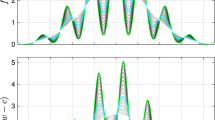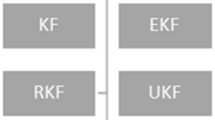Abstract
This paper considers the parameter estimation problem for an input nonlinear controlled autoregressive ARMA model. The basic idea is to combine the maximum likelihood principle and the gradient search and to present a maximum likelihood gradient-based iterative estimation algorithm. The analysis and simulation results show that the proposed algorithm can effectively estimate the parameters of the input nonlinear controlled autoregressive ARMA systems.





Similar content being viewed by others
References
Ding, F.: System Identification—New Theory and Methods. Science Press, Beijing (2013)
Ding, F.: System Identification—Performances Analysis for Identification Methods. Science Press, Beijing (2014)
Spall, J.: Identification for systems with binary subsystems. IEEE Trans. Autom. Control 59(1), 3–17 (2013)
Dai, J.Y., Tan, C., Ying, J., Wu, G.H.: Fuzzy multi-model switching H-infinity for helicopters in a full envelope. Circuits Syst. Signal Process. 32(5), 2185–2197 (2013)
Wang, D.Q., Ding, F.: Least squares algorithm for an input nonlinear system with a dynamic subspace state space model. Nonlinear Dyn. 75(1–2), 49–61 (2014)
Li, J.H., Ding, F., Hua, L.: Maximum likelihood Newton recursive and Newton iterative estimation algorithms for Hammerstein CARAR systems. Nonlinear Dyn. 75(1–2), 235–245 (2014)
Elliott, J., Kuen, S., Fung, S.: Filtering a nonlinear stochastic volatility model. Nonlinear Dyn. 67(2), 1295–1313 (2012)
Sun, J.L., Liu, X.G.: A novel APSO-aided maximum likelihood identification method for Hammerstein systems. Nonlinear Dyn. 73(1–2), 449–462 (2013)
Södersöm, T., Hong, M., Schoukens, J., Pintelon, R.: Accuracy analysis of time domain maximum likelihood method and sample maximum likelihood method for errors-in-variables and output error identification. Automatica 46(4), 721–727 (2010)
Shi, Y., Fang, H.: Kalman filter based identification for systems with randomly missing measurements in a network environment. Int. J. Control 83(3), 538–551 (2010)
Vörös, J.: Recursive identification of Hammerstein systems with discontinuous nonlinearities containing dead-zones. IEEE Trans. Autom. Control 48(12), 2203–2206 (2003)
Li, H., Shi, Y.: Robust H-infinity filtering for nonlinear stochastic systems with uncertainties and random delays modeled by Markov chains. Automatica 48(1), 159–166 (2012)
Ding, J., Fan, C.X., Lin, J.X.: Auxiliary model based parameter estimation for dual-rate output error systems with colored noise. Appl. Math. Model. 37(6), 4051–4058 (2013)
Shi, Y., Yu, B.: Robust mixed \(\text{ H }\_2/\text{ H }\_\)infinity control of networked control systems with random time delays in both forward and backward communication links. Automatica 47(4), 754–760 (2011)
Li, H., Shi, Y.: State-feedback H-infty control for stochastic time-delay nonlinear systems with state and disturbance-dependent noise. Int. J. Control 85(10), 1515–1531 (2012)
Ding, F.: Combined state and least squares parameter estimation algorithms for dynamic systems. Appl. Math. Model. 38(1), 403–412 (2014)
Zhang, Y., Cui, G.M.: Bias compensation methods for stochastic systems with colored noise. Appl. Math. Model. 35(4), 1709–1716 (2011)
Kulikova, V.: Maximum likelihood estimation of linear stochastic systems in the class of sequential square-root orthogonal filtering methods. Autom. Remote Control 72(4), 766–786 (2011)
Li, J.H., Ding, F., Yang, G.W.: Maximum likelihood least squares identification method for input nonlinear finite impulse response moving average systems. Math. Comput. Model. 55(3–4), 442–450 (2012)
Li, J.H., Gu, J.P., Ma, W.G., Ding, R.: Maximum likelihood forgetting stochastic gradient estimation algorithm for Hammerstein CARARMA systems. In: The 2012 24th Chinese Control and Decision Conference (2012 CCDC), May 23–25, Taiyuan, China, pp. 2545–2550 (2012)
Wu, A.G., Lv, L.L., Hou, M.Z.: Finite iterative algorithms for extended Sylvester-conjugate matrix equations. Math. Comput. Model. 54(9–10), 2363–2384 (2011)
Dehghan, M., Hajarian, M.: Iterative algorithms for the generalized centro-symmetric and central anti-symmetric solutions of general coupled matrix equations. Eng. Comput. 29(5), 528–560 (2012)
Wu, A.G., Lv, L.L., Duan, G.R.: Iterative algorithms for solving a class of complex conjugate and transpose matrix equations. Appl. Math. Comput. 217(21), 8343–8353 (2011)
Dehghan, M., Hajarian, M.: Finite iterative algorithms for the reflexive and anti-reflexive solutions of the matrix equation \(A_1X_1B_1+A_2X_2B_2=C\). Math. Comput. Model. 49(9–10), 1937–1959 (2009)
Xie, L., Liu, Y.J., Yang, H.Z.: Gradient based and least squares based iterative algorithms for matrix equations \(AXB+CX^TD=F\). Appl. Math. Comput. 217(5), 2191–2199 (2010)
Ding, F., Zhang, M.: Gradient-based iterative algorithm for a class of the coupled matrix equations related to control systems. IET Control Theory Appl. 8. doi:10.1049/iet-cta.2013.1044 (2014)
Liu, Y.J., Ding, F., Shi, Y.: An efficient hierarchical identification method for general dual-rate sampled-data systems. Automatica 50(3), 962–970 (2014)
Ding, F.: State filtering and parameter identification for state space systems with scarce measurements. Signal Process. 104, 369–380 (2014)
Hu, Y.B.: Iterative and recursive least squares estimation algorithms for moving average systems. Simul. Model. Pract. Theory 34, 12–19 (2013)
Wang, C., Tang, T.: Recursive least squares estimation algorithm applied to a class of linear-in-parameters output error moving average systems. Appl. Math. Lett. 29, 36–41 (2014)
Gu, Y., Ding, F., Li, J.H.: State filtering and parameter estimation for linear systems with d-step state-delay. IET Signal Process. 8(6), 639–646 (2014)
Xie, L., Yang, H.Z.: Gradient based iterative identification for nonuniform sampling output error systems. J. Vib. Control 17(3), 471–478 (2011)
Ding, J., Lin, J.X.: Modified subspace identification for periodically non-uniformly sampled systems by using the lifting technique. Circuits Syst. Signal Process. 33(5), 1439–1449 (2014)
Liu, Y., Bai, E.W.: Iterative identification of Hammerstein systems. Automatica 43(2), 346–354 (2007)
Vörös, J.: Iterative algorithm for parameter identification of Hammerstein systems with two-segment nonlinearities. IEEE Trans. Autom. Control 44(11), 2145–22149 (1999)
Gu, Y., Ding, F., Li, J.H.: States based iterative parameter estimation for a state space model with multi-state delays using decomposition. Signal Process. 106, 230–294 (2015)
Liu, Y.J., Xiao, Y.S., Zhao, X.L.: Multi-innovation stochastic gradient algorithm for multiple-input single-output systems using the auxiliary model. Appl. Math. Comput. 215(4), 1477–1483 (2009)
Wang, L.Y., Xie, L., Wang, X.F.: The residual based interactive stochastic gradient algorithms for controlled moving average models. Appl. Math. Comput. 211(2), 442–449 (2009)
Jiang, X.Z., Jian, J.B.: A sufficient descent Dai-Yuan type nonlinear conjugate gradient method for unconstrained optimization problems. Nonlinear Dyn. 72(1–2), 101–112 (2013)
Bai, E.W., Li, K.: Convergence of the iterative algorithm for a general Hammerstein system identification. Automatica 46(11), 1891–1896 (2010)
Liu, Y.J., Ding, R.: Consistency of the extended gradient identification algorithm for multi-input multi-output systems with moving average noises. Int. J. Comput. Math. 90(9), 1840–1852 (2013)
Aladag, C.H., Egrioglu, E., Kadilar, C.: Forecasting nonlinear time series with a hybrid methodology. Appl. Math. Lett. 22(9), 1467–1470 (2009)
Wang, C., Tang, T.: Several gradient-based iterative estimation algorithms for a class of nonlinear systems using the filtering technique. Nonlinear Dyn. 77(3), 769–780 (2014)
Xie, L., Yang, H.Z.: Interactive parameter estimation for output error moving average systems. Trans. Inst. Meas. Control 35(1), 34–43 (2013)
Bai, E.W.: An optimal two-stage identification algorithm for Hammerstein–Wiener nonlinear systems. Automatica 34(3), 333–338 (1998)
Li, J.H., Ding, F.: Maximum likelihood stochastic gradient estimation for Hammerstein systems with colored noise based on the key term separation technique. Comput. Math. Appl. 62(11), 4170–4177 (2011)
Li, J.H.: Parameter estimation for Hammerstein CARARMA systems based on the Newton iteration. Appl. Math. Lett. 26(1), 91–96 (2013)
Ding, F., Liu, X.P., Liu, G.J.: Identification methods for Hammerstein nonlinear systems. Digit. Signal Process. 21(2), 215–238 (2011)
Li, J.H., Ding, R.: Maximum likelihood gradient based identification algorithm for output error systems with colored noises. In: The 32nd Chinese Control Conference (2013 CCC), July 26–28, Xi’an, China, pp. 1968–1973 (2013)
Zhang, Y.: Unbiased identification of a class of multi-input single-output systems with correlated disturbances using bias compensation methods. Math. Comput. Model. 53(9–10), 1810–1819 (2011)
Ding, F.: Hierarchical parameter estimation algorithms for multivariable systems using measurement information. Inf. Sci. 277, 396–405 (2014)
Luan, X.L., Zhao, S.Y., Liu, F.: H-infinity control for discrete-time Markov jump systems with uncertain transition probabilities. IEEE Trans. Autom. Control 58(6), 1566–1572 (2013)
Zhu, D.Q., Huang, H., Yang, S.X.: Dynamic task assignment and path planning of multi-AUV system based on an improved self-organizing map and velocity synthesis method in 3D underwater workspace. IEEE Trans. Cybern. 43(2), 504–514 (2013)
Zhu, D.Q., Liu, Q., Hu, Z.: Fault-tolerant control algorithm of the manned submarine with multi-thruster based on quantum behaved particle swarm optimization. Int. J. Control 84(11), 1817–1829 (2012)
Sun, B., Zhu, D.Q., Yang, S.X.: A bio-inspired filtered backstepping cascaded tracking control of 7000m manned submarine vehicle. IEEE Trans. Ind. Electron. 61(7), 3682–3692 (2014)
Acknowledgments
This work was supported by the National Natural Science Foundation of China (Nos. 61273194, 61403217) and the PAPD of Jiangsu Higher Education Institutions.
Author information
Authors and Affiliations
Corresponding author
Rights and permissions
About this article
Cite this article
Chen, F., Ding, F. & Li, J. Maximum likelihood gradient-based iterative estimation algorithm for a class of input nonlinear controlled autoregressive ARMA systems. Nonlinear Dyn 79, 927–936 (2015). https://doi.org/10.1007/s11071-014-1712-7
Received:
Accepted:
Published:
Issue Date:
DOI: https://doi.org/10.1007/s11071-014-1712-7




